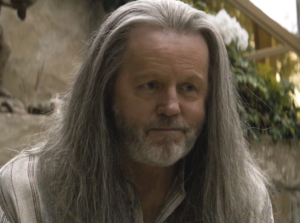This Post is Not About True Detective Season Two
 Meet Eliot Bezzerides, the wealthy and well-connected hippy-dippy father of detective Antigone “Ani” Bezzerides. A supporting role in the grossly under-rated second season of True Detective, he serves as something of a red-herring in the narrative.
Meet Eliot Bezzerides, the wealthy and well-connected hippy-dippy father of detective Antigone “Ani” Bezzerides. A supporting role in the grossly under-rated second season of True Detective, he serves as something of a red-herring in the narrative.
Eliot shows exactly which side of the good/evil divide he calls home when he specifically name checks corrupt dullard and former Supreme Court justice Ruth Bader Ginsberg as a close, personal friend. Those of us dialed into modern politics instantly recognized that as a red flag. This man clearly runs in circles dedicated to the sexual exploitation of children, and thus hangs a neon sign of suspicion around his neck. A sign which – spoilers for an eight year old show – proves wholly accurate as late-season episodes reveal that he was instrumental in arranging the repeated rape of his young daughter.
But wait…the thoughtful viewer pauses at the mention of the deservedly Notorious RBG. This show came out in 2015, at the height of the push to convince America that her shrewd political cunning was actually a genuine wisdom. This was no red flag, but a red herring; this was meant to be a set-up that would pay off when the truth of Eliot’s child-predations came to light. The red-flag was meant to serve as a red-herring.
Realizing this potential, the truly deep thinker found himself cast into an entirely unintentional conundrum. Surely this Hollywood production about corruption in LA wouldn’t present TV-RBG’s good buddy as the sort of child rapist that Real-RBG hobnobbed with, would it? Uncertainty lingered until the show did just that, which was impressive in its own right.
But notice the ultimate effect here. The entire culture of Hollywood – the culture of attempting to create an American culture instead of reflecting American culture – undermines the show’s central mystery. Instead of watching the narrative to gather clues and solve the mystery of who killed Caspere, the viewer is pulled out of the narrative. The question of means, motive, and opportunity of the killer gets shoved aside due to questions about the means, motive, and opportunity of the writer.
Given how well the show is written otherwise, this stumble shines all the brighter. It’s a missing tooth in an otherwise perfect smile.
The real lesson to take away from this? Ruth Bader Ginsberg made everything she touched, no matter how lightly, worse.